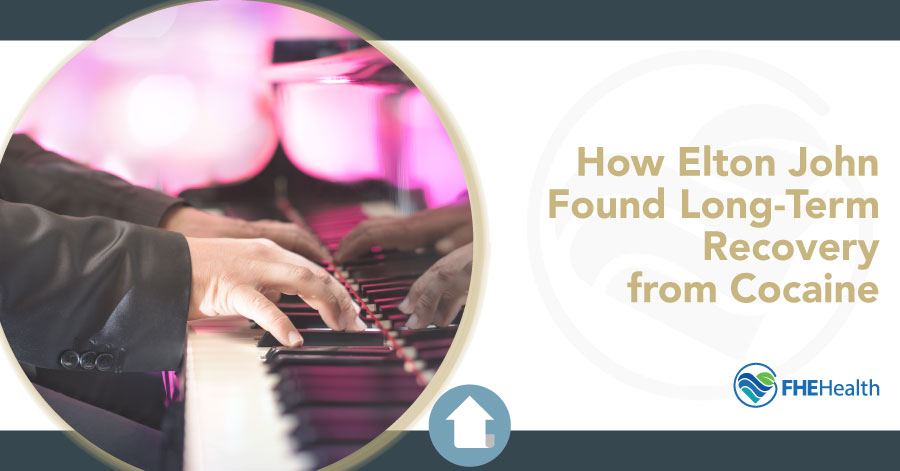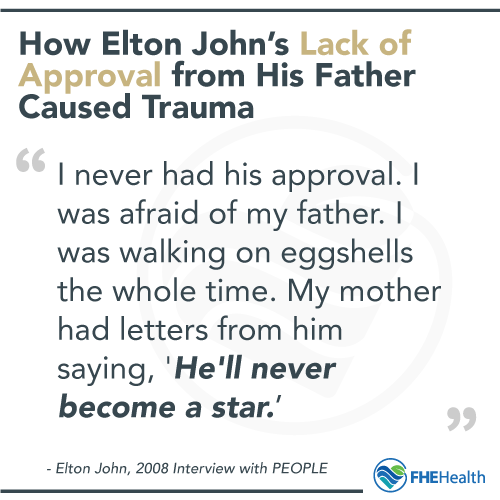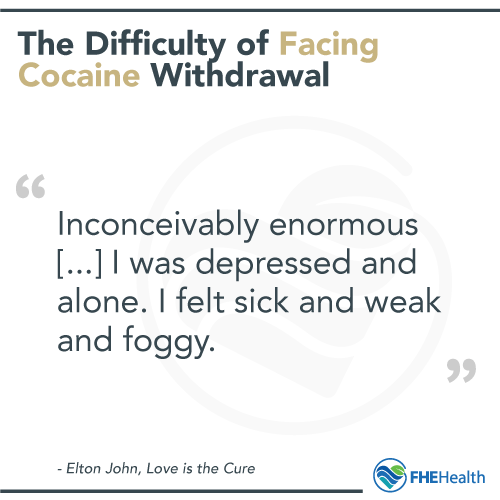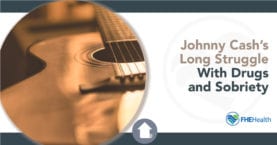
If you’re a fan of Elton John, you know at least a bit about his struggles with substance abuse addiction. Over the years, the singer has shared a lot about his drug problems and his recovery. Keep reading for answers to questions such as “Where did Elton John go to rehab?” and “What made him finally get help?”
Elton John Talking About His Addiction
Elton John is one of the world’s most famous singers. He has a musical career spanning over 6 decades, with more than 300 million records sold and 32 studio albums released. In the 1970s, as his career was climbing, Elton John turned to drugs to cope with the pressure of fame.
Recently, the legendary performer opened up about his rise to fame and his struggles with drug addiction. His life, poignantly depicted in the 2019 musical biopic Rocketman, was marked by glamor, wealth and prestige. But all that glitz hid the singer’s authentic self, one that was shy, insecure and in perpetual need of an absent father’s love.
The singer recalls that his drug addiction almost cost him his life many times. “I mean, I would have an epileptic seizure and turn blue, and people would find me on the floor and put me to bed, and then 40 minutes later I’d be snorting another line,” he stated.
View this post on Instagram
A Life of Fame and Drugs

So, what drugs did Elton John do? The substances he became addicted to were primarily cocaine and alcohol.
Early in his career, John’s manager and lover, John Reid, introduced the singer to cocaine. In an interview with NPR, John said, “I always said cocaine was the drug that made me open up. I could talk to people.”
Shy, insecure and uncomfortable, John felt transformed by cocaine. It made him light up and feel on the inside the way he looked on the outside while performing in sequins and feathers. Cocaine gave him the self-confidence and self-approval that had been missing from his life since his early childhood.
John’s father was distant and cold. “I never had his approval,” John revealed to People magazine. “I was afraid of my father. I was walking on eggshells the whole time. My mother had letters from him saying, ‘He’ll never become a star.'”
For Elton John, cocaine and turbulent inner emotions would prove a potent mix. It never takes long for cocaine, the ultimate party friend, to show its true colors, and it did for John. He said cocaine was also the drug that closed him down, leaving him unable to leave his hotel room for days and even weeks.
During the most chaotic days of his drug use, the musician thought he wouldn’t survive. “There were times I was having chest pains or staying up for 3 days at a time,” he noted. His friends would find him on the floor and put him to bed, but he’d be up mere hours later, doing another line of cocaine. In addition, John would drink and take other drugs. He came to believe that he’d die if he didn’t get sober.
The Dangers of Cocaine
Cocaine is one of those drugs that many people feel desensitized to. It’s often mentioned as a party drug in movies and songs and by famous people. For some, cocaine has become as normal to see at a party as alcohol or marijuana.
In the United States, approximately 2.2 million people use cocaine regularly, so it can feel like many people recreationally use cocaine without negative consequences. But that’s not an accurate representation, as proven by Elton John’s addiction. In fact, 1.5 million Americans are estimated to meet the qualifications for a cocaine use disorder.
Not only is cocaine highly addictive, but long-term use comes with many possible side effects, such as:
- Potential lung and organ damage
- Loss of smell and nose problems from frequent snorting
- Heart disease, heart attack and stroke
- Movement disorders, such as Parkinson’s disease
- Kidney issues
- Coma
- Overdose
- Death
View this post on Instagram
Elton John’s Rehab Timeline: The Turning Point That Led to Recovery
In 1990, Elton John finally checked into a hospital in Chicago. There, he penned a letter to his “worst, best friend, cocaine,” acknowledging he’d never touch it again. John believed he needed cocaine to communicate. What he learned in treatment was that he truly didn’t need the drug to converse, sing, cope with loneliness or take the place of love.
One of the reasons John chose to get sober was meeting Ryan White, a young boy who suffered from hemophilia and contracted HIV through a blood transfusion. White’s death shook the singer and helped him realize that he wanted to help others. He started the Elton John AIDS Foundation and has attempted to help various friends, including Eminem and George Michael, overcome their substance addictions.
“I had the luck to meet Ryan White and his family. I wanted to help them, but they ended up helping me much more. Ryan was the spark that helped me recover from my addictions and start the AIDS foundation. Within 6 months [of White’s death] I became sober and clean and have been for 27 years.”
On looking back, John says he felt ridiculous that it took him 16 years to declare that he needed help battling his drug addiction, but when he said the words, “I need help,” he meant them and understood that he’d turned the corner and made the choice that would save his life.
It may have taken a long time to get to rehab, but it only took one time in rehab for the singer to become sober for life.
How Elton John Quit Drugs

John revealed that while in rehab in Chicago, his cravings for cocaine were “inconceivably enormous.” During the time he was in withdrawal from cocaine, he also stopped medicating with food, alcohol and sex. “I was depressed and alone. I felt sick and weak and foggy.”
The musician added that the early stages of his time in rehab were among the most difficult experiences of his life, and he seriously contemplated leaving. John acknowledges that the path he took in rehab wasn’t a straight line to recovery. What kept the singer from leaving were his current boyfriend and his respect for young Ryan White, who lost his battle to AIDS. He also credits the kindness of the people in rehab for helping him progress and stay the course.
John said that in rehab, he was just Elton — not Elton John the Rock Star. He and the others there were all struggling, and none of them really knew if they’d make it, if they’d be able to stay sober.
Some have questioned why John doesn’t discuss the “12 steps” or talk more about the experiences in rehab that helped him get clean. He’s indicated, however, that it was the beginning of his new path and his development of a life of sobriety post-rehab had everything to do with his AIDS foundation and working to maintain the transformation that had begun within himself during his rehab stay.
View this post on Instagram
Where Did Elton John Go to Rehab?
John chose to get treatment at Chicago’s Parkside Lutheran Hospital because it was one of the few treatment centers at the time that could treat his bulimia alongside his addictions to cocaine and alcohol. He’s grateful that he managed to stay and didn’t abandon treatment. The singer shared that while treatment was challenging, he felt “invigorated” with each day he stayed sober, and he could feel himself regaining control of his life.
Lessons to Learn From Elton John’s Recovery
Elton John’s story showcases that it’s never too late to recover from a substance abuse addiction. It took Elton John 16 years to admit he needed help battling his addiction. Even with his fame, wealth and talent, he understood that he couldn’t do it alone. Everyone can find the road to sobriety; they just might need some help along the way.
FHE Health
FHE Health is a top-tier mental health and substance abuse addiction rehabilitation facility. Our compassionate staff members have experience dealing with every type of condition, and our treatment programs are personalized to match each patient’s unique needs. Contact us today and take the first step toward recovery.









